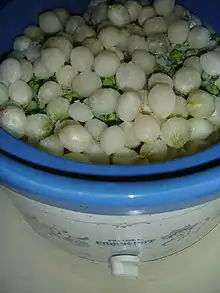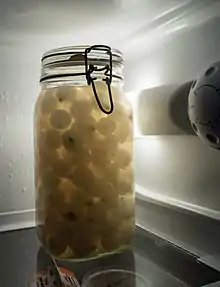Pearl onion
The pearl onion (Allium ampeloprasum var. sectivum or A. ampeloprasum 'Pearl-Onion Group'),[1] also known as button, baby or silverskin onions in the UK,[2] or creamers in the US,[3] is a close relative of the leek (A. ampeloprasum var. porrum), and may be distinguished from common onions by having only a single storage leaf,[4] similar to cloves of garlic. In French they are known as oignon grelot. One English-speaking reference also mentions the term petit poireau antillais.[5]
| Pearl onion | |
|---|---|
 Pearl onions and peas topping a crockpot dish | |
| Species | Allium ampeloprasum var. sectivum or A. ampeloprasum 'Pearl-Onion Group' |
| Cultivar | 'Pearl onion' |
Cultivation and storage
Pearl onions are cultivated mostly in Germany, the Netherlands, and Italy,[6] usually in home gardens,[1] although formerly on a commercial scale.[5] They are mostly used for pickling.[7]
The majority of onions grown for pickling are common onions (A. cepa).[8] They are grown to a small size suitable for pickling by planting at a high density.[9]
Known small white varieties include Crystal Wax,[6] or White Bermuda.[10] Red varieties are milder in flavour.[11] Pearl onions are ready to harvest from seed in 90 days.[10] They can be stored for up to a month in a cool, dry, dark place.[11][12]
Consumption

Because of its uniquely small size and a taste sweeter than that of a common onion,[2][10] it has also been used in dishes ranging from mid-20th-century American casserole dishes such as succotash to sweetly flavored onion relishes in Indian cuisine. It can also be used in stews soups or sautéed (fried) with other vegetables.[3][2][13] It can also be used in cocktails such as "martini standing".[6]
Pearl onions are a staple to the cuisine of Northern Europe. Also in modern Europe they are used as a beautiful flowering plant and in Israel as a cut flower.[5]
Pearl onions contain chemical compounds that have health benefits including helping cardiovascular health and stabilize blood sugar levels, and acting as an antioxidant and anti-inflammatory.[11][12]
Cultural references
Larry Wall's yearly serious State of the Onion speeches about advancements in Perl programming, an allusion to the many layers of the language, are named as a pun both on the pearl onion and the US presidents' State of the Union addresses.
References
- Fritsch, R.M.; N. Friesen (2002). "Chapter 1: Evolution, Domestication, and Taxonomy". In H.D. Rabinowitch and L. Currah (ed.). Allium Crop Science: Recent Advances. Wallingford, UK: CABI Publishing. p. 9. ISBN 0-85199-510-1.
- "Onion". waitrose.com. Retrieved 23 January 2017.
- Pearson, Liz (21 December 2007). "SKINNING A PEARL ONION". saveur.com. Retrieved 23 January 2017.
- AVRDC - The World Vegetable Center. "Onion cultivation". Archived from the original on 4 March 2011. Retrieved 25 April 2011.
- "Parisian Onions". traveltoeat.com. 17 June 2012. Retrieved 23 January 2017.
- Linda Griffith and Fred Griffith Onions, Onions, Onions: Delicious Recipes for the World's Favorite Secret ..., p. 126, at Google Books
- Hanelt, Peter (2001). "Alliaceae". In P. Hanelt (ed.). Mansfeld's Encyclopedia of Agricultural and Horticultural Crops (except ornamentals). Berlin: Spring-Verlag. p. 2266. ISBN 3-540-41017-1.
- Fritsch, R.M.; N. Friesen (2002). "Chapter 1: Evolution, Domestication, and Taxonomy". In H.D. Rabinowitch and L. Currah (ed.). Allium Crop Science: Recent Advances. Wallingford, UK: CABI Publishing. p. 20. ISBN 0-85199-510-1.
- Brewster, James L. (1994). Onions and other vegetable alliums (1st ed.). Wallingford, UK: CAB International. p. 212. ISBN 0-85198-753-2.
- "Pearl Onions". cooksinfo.com. Retrieved 23 January 2017.
- "Pearl Onions". bonappetit.com. 6 February 2008. Retrieved 23 January 2017.
- "Pearl onion nutrition selection storage". fruitsandveggiesmorematters.org. Retrieved 23 January 2017.
- Maister, Kathy. "How to Peel Pearl Onions". startcooking.com/. Retrieved 23 January 2017.
.jpg.webp)
